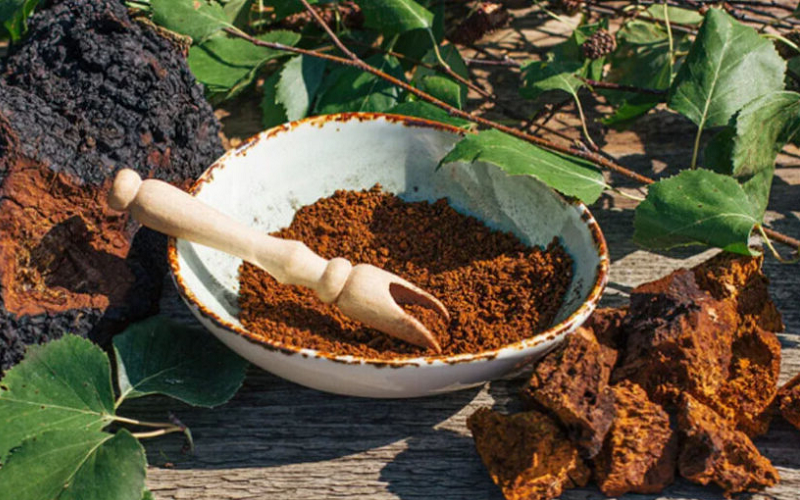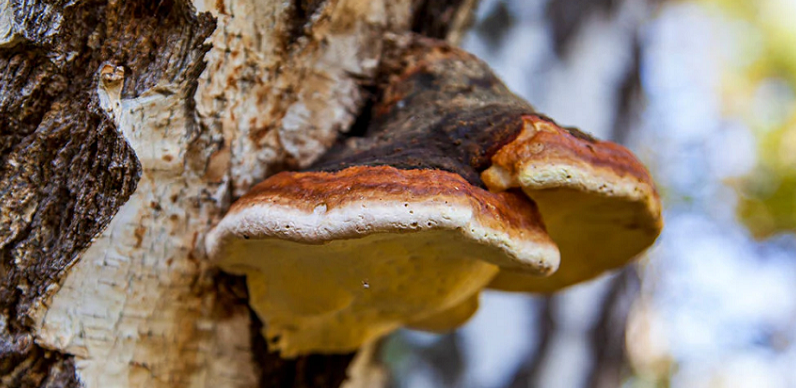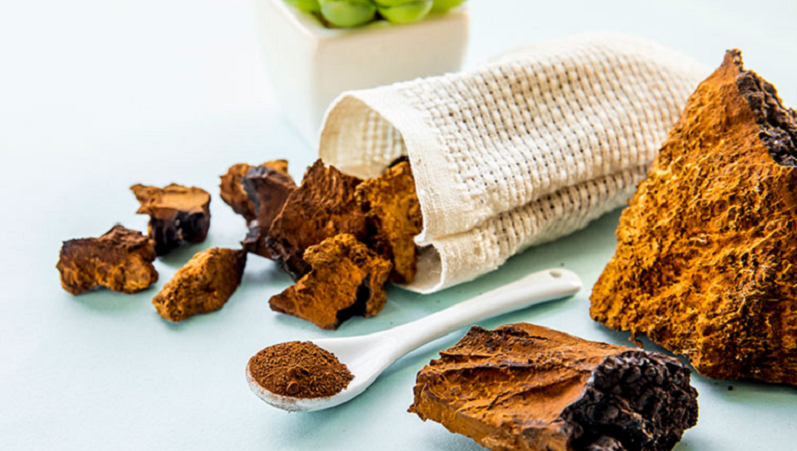
In the vast, verdant forests of the Northern Hemisphere, nature has concealed one of its most intriguing secrets: the Chaga mushroom. Known to some as a mere oddity on birch trees, this unassuming fungus has been revered in traditional medicine for centuries. Chaga mushrooms are not just another health fad; they are a testament to the enduring wisdom of nature and its untapped potential in enhancing our well-being. From its immune-boosting properties to its role in potentially combating chronic diseases, Chaga mushrooms present a compelling case for the power of natural remedies in our contemporary health discourse.
Contents
What Are Chaga Mushrooms?
Chaga mushrooms, while not widely known in the mainstream health community, hold a treasure trove of benefits that have been tapped into for centuries. To truly appreciate their value, it’s essential to understand what they are, their history, and where they come from.
Description and Characteristics of Chaga Mushrooms
Chaga mushrooms (Inonotus obliquus) are unique in appearance and unlike the typical mushrooms one might envision. They are hard, crusty formations that resemble a clump of burnt charcoal, primarily due to the high melanin content. Found predominantly on the bark of birch trees in cold climates, Chaga grows in a parasitic yet symbiotic relationship with its host tree. Its interior reveals a rich, rusty brown color, indicative of its dense nutrient content.
Historical Use of Chaga Mushrooms in Traditional Medicine
The use of Chaga mushrooms dates back centuries, particularly in Eastern Europe, Russia, and parts of Asia. Traditional Siberian medicine revered it for its vitality-enhancing properties, while in Chinese medicine, it was known for promoting longevity and overall health. These cultures used Chaga to treat a variety of ailments, from gastrointestinal issues to skin conditions. The indigenous peoples of North America also recognized Chaga’s medicinal qualities, utilizing it as a remedy for various health problems.
Geographical Distribution and Harvesting Practices of Chaga Mushrooms
Chaga is primarily found in the birch forests of Russia, Northern Europe, Korea, and some parts of North America, particularly in colder climates. The harvesting of Chaga involves carefully removing the mushroom from the birch trees without harming the tree itself. This practice ensures sustainable harvesting, allowing for regrowth and continued symbiosis. Traditionally, Chaga was harvested wild, but with growing interest, there are now efforts to cultivate it sustainably to meet increasing demand [1].

Nutritional Profile of Chaga Mushrooms
The true value of Chaga mushrooms lies in their impressive nutritional makeup. Here we get into the specifics of what makes Chaga a nutritional powerhouse, how it compares with other medicinal mushrooms, and the scientific perspective on its value.
Key Nutrients and Compounds in Chaga Mushrooms
Chaga mushrooms are a rich source of a variety of nutrients and bioactive compounds. They contain an abundance of B-complex vitamins, flavonoids, phenols, minerals, and enzymes. One of the most notable components is beta-glucans, a form of soluble dietary fiber known for its immune-boosting properties. Chaga is also rich in antioxidants, including triterpenoids and a high level of melanin, which gives it the distinctive dark color and is known for protecting DNA and promoting skin health.
Comparison of Chaga Mushrooms with Other Medicinal Mushrooms
When compared to other medicinal mushrooms such as Reishi, Cordyceps, and Lion’s Mane, Chaga holds its own as a unique contributor to health. While all these mushrooms have beneficial properties, Chaga stands out for its high antioxidant content. For instance, its ORAC (Oxygen Radical Absorbance Capacity) score, a measure of antioxidant potency, is considerably higher than that of most other medicinal mushrooms, making it exceptionally effective at combating oxidative stress.
Scientific Perspective on Nutritional Value of Chaga Mushrooms
From a scientific standpoint, the interest in Chaga mushrooms has grown in recent years. Research studies have begun to validate the traditional claims about Chaga’s health benefits, attributing them largely to its rich nutritional profile. Scientists have been particularly interested in studying its antioxidant properties and how they contribute to health and wellness. It’s important to note, however, that while initial research is promising, more comprehensive studies are needed to fully understand the extent of Chaga’s nutritional benefits [2].
Health Benefits of Chaga Mushrooms
The growing interest in Chaga mushrooms is largely due to their wide range of health benefits. Supported by both traditional use and emerging scientific research, these benefits range from boosting the immune system to potential roles in cancer prevention.
Boosting Immune System Function
One of the most celebrated effects of Chaga mushrooms is their ability to strengthen the immune system. The beta-glucans in Chaga help balance the immune system, making it more efficient. This means not only stimulating the immune response when necessary, such as fighting off infections, but also calming it down to prevent overreactions, which is crucial in autoimmune diseases.
Anti-Inflammatory Properties
Chaga’s anti-inflammatory properties are another key aspect of its health benefits. Chronic inflammation is a root cause of many diseases, and the compounds in Chaga, such as betulinic acid, have been found to help reduce inflammation. This can be beneficial in conditions ranging from simple aches and pains to more complex issues like arthritis or heart disease [3].
Antioxidant Effects and Combatting Oxidative Stress
Chaga mushrooms are rich in antioxidants, which are crucial in fighting oxidative stress – an imbalance between free radicals and antioxidants in the body. Oxidative stress is associated with aging and many chronic diseases. The high antioxidant content in Chaga helps neutralize these free radicals, potentially reducing the risk of disease and slowing the aging process.
Potential in Cancer Prevention and Treatment
There is growing interest in the role of Chaga in cancer prevention and treatment. Some studies suggest that compounds in Chaga can inhibit cancer cell growth and induce cell death in certain types of cancer. While this research is in its early stages and more evidence is needed, these findings are promising for future therapeutic applications.
Supporting Digestive Health
Chaga’s benefits extend to the digestive system as well. Its anti-inflammatory properties can help soothe the digestive tract, and the fiber content supports a healthy gut microbiome. A well-functioning digestive system is essential for overall health, making Chaga a valuable supplement for gut health.
Impact on Cardiovascular Health
Chaga mushrooms may also have benefits for heart health. Their compounds have been linked to lowering cholesterol levels, reducing blood pressure, and improving circulation. These effects can contribute to a reduced risk of heart disease [4].
Other Reported Health Benefits
Beyond these key areas, Chaga is also associated with a range of other health benefits. These include improving skin health, supporting healthy blood sugar levels, and enhancing overall stamina and energy levels. The scope of benefits makes Chaga a versatile natural remedy.

Scientific Research and Studies on Chaga Mushrooms
As Chaga mushrooms gain popularity in the health and wellness community, scientific research has started to catch up, aiming to understand and validate the traditional claims associated with this unique fungus. This section explores the breadth of scientific inquiry into Chaga mushrooms, highlighting key findings, current limitations, and potential directions for future research.
Overview of Key Research Findings Involving Chaga Mushrooms
Scientific studies on Chaga mushrooms have primarily focused on their antioxidant properties, immune system modulation, anti-inflammatory effects, and potential anti-cancer activities. Numerous studies have identified Chaga as a rich source of antioxidants, particularly highlighting its high content of superoxide dismutase (SOD), an enzyme that plays a critical role in protecting the body from oxidative damage. Research into its immune-modulating effects has shown promising results, with Chaga extracts demonstrating the ability to stimulate immune cells while also potentially reducing inflammation.
In the realm of cancer research, several laboratory and animal studies have suggested that Chaga extracts can inhibit the growth and proliferation of cancer cells. Notably, studies have observed these effects in various types of cancer, including breast, lung, and colon cancer. However, it’s important to emphasize that most of this research is still at a preliminary stage, and human trials are needed to confirm these findings [5].
Current Limitations and Future Research Directions of Chaga Mushrooms
While the existing research on Chaga mushrooms is promising, there are significant limitations to consider. Most studies to date have been conducted in vitro (in a laboratory setting) or in vivo (in animals), and there is a lack of large-scale clinical trials on humans. This gap in research means that while the early results are encouraging, they cannot yet be conclusively applied to human health.
Future research directions involve conducting comprehensive clinical trials to validate the efficacy and safety of Chaga mushrooms in treating or preventing various health conditions. Additionally, more studies are needed to understand the bioavailability of Chaga compounds – how well they are absorbed and utilized by the human body.
Debunking Chaga Mushrooms Myths and Misconceptions
As with many natural remedies, there are myths and misconceptions surrounding Chaga mushrooms. Some of these include exaggerated claims about its effectiveness in curing diseases or misinterpretations of the scientific data. It’s vital for researchers and health professionals to address these misconceptions, providing clear and accurate information based on solid scientific evidence.
References
[1] Chaga benefits, dosage, and side effects
[2] 5 Reasons to Consider Chaga Mushrooms
[3] Recent Developments in Inonotus obliquus (Chaga mushroom) Polysaccharides: Isolation, Structural Characteristics, Biological Activities and Application
[4] Chaga Mushroom Health Benefits
[5] Chaga Mushroom: Purported Benefits, Side Effects & More
